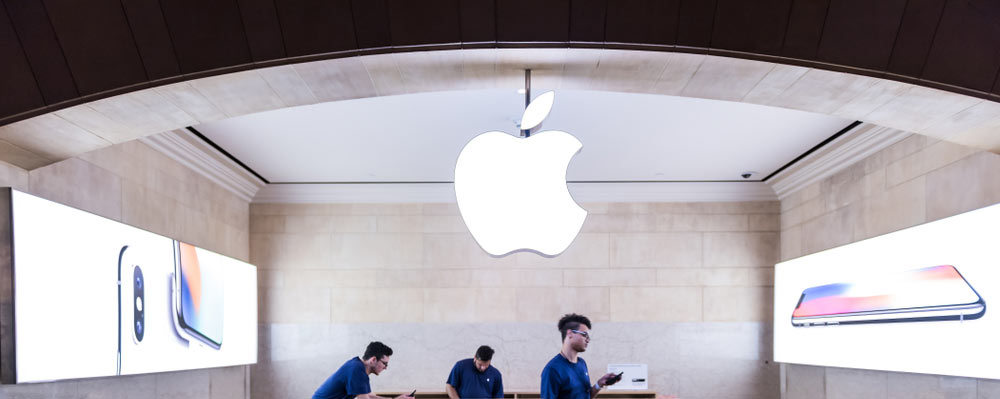Back in the day, I used to lug around a binder full of CDs. It was the only alternative to listening to radio stations filled with talk and commercials.
In my car, I had a six-disc changer filled with the latest grunge musicians — with a little Pink Floyd and Led Zeppelin sprinkled in for variety. It was the mid-‘90s version of Bluetooth music.
The advent of the Apple Inc. (Nasdaq: AAPL) iPod in 2001 changed all that. I could put my entire binder of nearly 100 CDs on one device. And with a handy-dandy cassette adapter, my six-disc changer was quickly made obsolete.
The iPod was revolutionary. It was a game changer for so many industries that I could fill this article listing them.
And it wasn’t the first, or the last, revolutionary Apple product.
The Apple Macintosh computer was a pioneer with a graphical user interface and the world’s first personal computer mouse. Both innovations continue to define modern computer systems.
And let’s not forget the iPhone, which set the standard for modern smartphones with touchscreens and tappable user applications.
Next week, on June 29, the iPhone turns 11. Sadly, aside from speed and graphics upgrades, not much has changed in the past decade for the iconic device.
The same can be said of Apple.
Once filled to the brim with genius ideas and revolutionary products, Apple has not released a breakthrough product in more than a decade. This realization got me thinking … does Apple deserve to be a $1 trillion company?
The $1 Trillion Question
A $1 trillion valuation. It sounds incredibly impressive. No publicly traded American company has ever hit the $1 trillion mark.
Last week, Apple stock came within just 1.6% of hitting this historic milestone. In the current hype-filled bull market, it seems almost inevitable that Apple will go down in the record books as the first this year.
In some ways, Apple deserves this milestone. It would be the equivalent of getting a lifetime achievement award at the Oscars. Recognition for all the company’s past achievements — for setting the modern technological stage.
But that’s all it would be. Once the pomp and circumstance subsides, Apple is still a company that last saw the edge of technological innovation more than 10 years ago. Now it chases other, more innovative companies like Netflix, Tesla and Nvidia into the emerging markets of streaming content, self-driving cars, virtual reality and artificial intelligence.
Granted, it does this while leveraging a massive iPhone install base. This is Apple’s true edge in the market. It’s why analysts continue to project that Apple’s services like music and streaming content will start to make up for stagnating hardware sales. Millions of iPhone users could spend millions more dollars on services.
There’s some truth to this sentiment. Take Apple’s most recent quarterly report. iPhone sales made up 62% of Apple’s revenue in the second quarter. But Apple’s Services division saw a 31% surge in revenue year-over-year. Paid subscriptions to services like Apple Music topped 270 million.
Strong services growth is an excellent argument for a $1 trillion valuation. But that growth and valuation only holds true if Apple’s iPhone install base continues to expand.
What happens if iPhone sales growth continues to decline?
Apple’s Tariff Troubles
The truth of the matter is that Apple is still dependent on iPhone sales. It needs these devices in the hands of new consumers so it can sell them services. But both iPhone consumer growth and iPhone production are currently under threat.
Last week, President Donald Trump announced $200 billion in new tariffs on China. China reciprocated with $50 billion in new tariffs, including semiconductors.
This is bad news for Apple. China accounted for 20% of Apple’s revenue last year — about $44.7 billion. Furthermore, Apple shipped roughly 41 million iPhones to China. In short, China is both a major growing iPhone market (services and devices) and a major source of production for Apple.
Apple CEO Tim Cook has reportedly reassured investors that Trump will exclude Apple from the tariffs, but there’s no guarantee China will reciprocate. These tariffs hurt the company both coming and going.
The Bottom Line
So, will Apple hit a $1 trillion valuation this year? More than likely, given the sheer momentum behind the current bull market.
The real question is: Does Apple deserve a $1 trillion valuation? My answer is a resounding no. Even factoring in additional services revenue, Apple still needs an innovative product to revitalize consumers. The iPhone base is stagnating. Services revenue will only replace slowing iPhone revenue.
Apple needs that “one more thing…” as co-founder Steve Jobs used to say. The iPhone X wasn’t it. New high-definition iPhone screens aren’t it. Removing the headphone jack isn’t it.
Apple needs a new product. And it needs it now.
Until next time, good trading!
Regards,

Joseph Hargett
Assistant Managing Editor, Banyan Hill Publishing
Editor’s Note: Financial expert Ted Bauman set out to create a simple-to-use trading system that was virtually crash-proof and could grow a retirement nest egg up to nine times faster than ordinary investing. He was told that such a system was impossible to create. Many laughed at him. However, after back testing his system across 10 years of market data, Ted and his team not only hit their goals … they far surpassed them. To find out how Ted’s groundbreaking system finally lets you have the comfortable, carefree retirement you deserve, click here.



